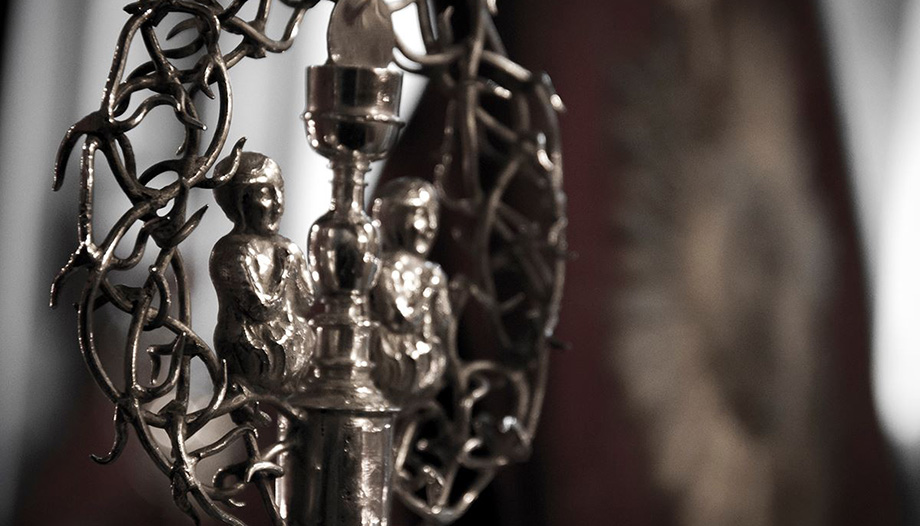Translation of the article into Italian
Man is sociable by nature, which means that he needs others in order to develop integrally, not only physically. The first area of socialization is the family. In the family, the child discovers himself as a person different from others, he feels loved in the arms of his mother, who welcomes him. He also feels safe when his father plays at throwing him in the air, he even laughs, because he knows that his father will not fail him, he will always pick him up. This is how he begins to build bonds with those closest to him.
Brotherhood is another sphere of socialization, based not only on a shared faith, but also on the manifestations of popular religiosity, which reaches its fullness during Holy Week. It is important, and very important, to maintain and deepen these external forms of religiosity, so varied according to geography, that make us share roots with others in order to grow together. It is necessary to take care of these traditions, as simple as decisive, because "love is simple and simple things are devoured by time" as Chavela Vargas explains. In some places today there is a tendency to import styles or modes of popular expression from other regions, to the detriment of their own customs, which lose their meaning when they are transferred. This does not seem to be a good idea.
But popular religiosity is not resolved exclusively in actions, in activities, genuine or imported. In the play Faust, its author, Goethe, puts in the protagonist's mouth a statement that has given rise to numerous comments: "in the beginning was action", an action that has no beginning and end other than itself, for this reason Faust declares that he does not seek happiness, only to guarantee his commitment of dedication to movement, to activity, without rest. Every end, that to which the action tends, must be excluded.
Well before, St. John had affirmed the opposite: "in the beginning was the Word," that is, the Word, the Truth. Jesus is the eternal Word of God who, sent into the world, communicates to men, through his words and works, the truth about God and about himself, thus presenting the unity between Truth, Good and Beauty, which leads man, through Christ, to the Father in the Holy Spirit, making him a sharer in the Trinity, in which the sociability of man culminates.
What does this have to do with sororities?
There is now much talk of the liquid society, a society without firm convictions, which assumes without question the criteria imposed on it, in the same way that a liquid always takes the form of the container that holds it, and which is now configured from a radical anthropocentrism that tries to impose, like Faust, the unconditional primacy of action.
In this situation the brotherhoods have to overcome the loop of managing the routine, without posing new challenges, new horizons. Otherwise they could slide towards action as an end in itself, without foundation or orientation to the Truth, encouraging a popular religiosity that is exhausted in itself, not as a basis for reaching the Truth, complete socialization, and influencing society.
It is not now a matter of the brotherhoods proposing technical solutions for the resolution of social problems, nor of imposing systems, nor of manifesting partisan preferences, but of proclaiming moral principles, also those referring to the social order, as well as giving criteria on any human matter, insofar as the fundamental rights of the human person demand it.
Social models are resolved in the field of anthropology. They do not build themselves from action, they are the consequence, not the engine. That is why it is necessary to rearm ourselves intellectually and doctrinally. That is where the brotherhoods reach their raison d'être, to take up this challenge. In a political scenario as liquid as the one we live in, it is even more necessary to have a solid conceptual model.
In summary: the functioning of the brotherhoods as an area of socialization, is not exhausted in the realization of activities, these are a means. Nor is it a matter of encouraging the brother to adjust his existence to the fulfillment of ethical commitments, but of providing him with formation and means so that his action reveals a person adjusted to Truth, Good and Beauty and therefore to his fullness as a person, as proposed by Karol Wojtyla in "Person and Action" and later by Benedict XVI in his encyclical "Fides et Ratio".
D. in Business Administration. Director of the Instituto de Investigación Aplicada a la Pyme. Eldest Brother (2017-2020) of the Brotherhood of the Soledad de San Lorenzo, in Seville. He has published several books, monographs and articles on brotherhoods.







